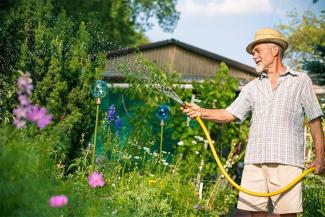
With the population of elderly persons, above 60, increasing substantially, the need for comfortable, well-equipped retirement homes, a relatively new concept in India, has arisen. Here is a 14-point checklist to help you choose the best assisted living home to ensure a safe, healthy and happy stay.
- Check it out: Ideally, find a home that has guest-room facilities where you can stay for a few days. This will allow you to check out whether the lifestyle will suit you. Plan to stay for at least a week before you make up your mind. You will notice things that are missed out in a quick tour. Focus on the attitude of staff and residents – do people look relaxed and happy? Get your family and children to visit the home too; it would reassure them that you are not going to be lonely and cut-off.
- Type of Facility: Check the climate, design and layout of the community. Make a basic choice such as whether you want a resort-like place or a regular housing complex.
- Language: In India, language is an important issue. For instance, someone from north India will find it tough to retire in Kerala, however pretty the facility, if all the staff and residents speak only the local language.
- Food: Remember, you expect to give up the chores of cooking and cleaning and will have to eat there for the rest of your life.
- Daily Living: Check the claimed amenities within the unit as well as the shared facilities – housekeeping facilities, hygiene, cleanliness, maintenance (Including pest control), infrastructure (ramps, guard rails, anti-skid tiles, etc).
- Residents’ Involvement: Check whether residents are consulted in managing and running of the premises. Mohan Siroya, chairperson of the Consumer Complaints Cell, says that “the tripartite agreement between a resident and service provider that I signed provides for arbitration of disputes , with the arbitrator’s order being binding. Residents cannot approach a court. Worse, the cost of arbitration has to be borne by residents, but the arbitrator is selected by the developer. Such one-sided agreements and poor services will give the entire business a bad name. I feel that a nonbiased Resident’s Council will help ensure fair practices.”
- Staff: Patience and empathy is needed to handle seniors. Is the staff trained for it?
- Medical Facilities: Is the promised infrastructure available at all times (doctor, nurse, fully equipped medical room with supplies, stretcher, wheelchair, etc)? Are residents registered with a full-facility hospital nearby (it is important that there is such a hospital within 30 minutes drive from home).
- Recreation: Does the retirement home have a good television room, card/games rooms, open spaces for functions, garden and temple? Ideally, you need a place that has a focus on recreation and organises entertainment, talks and music programmes, shopping and movie outings, picnics, celebrations, etc, on a regular basis.
- Connectivity: Distance from city centre and whether access to it is made available to residents through regular buses, etc. You are retiring but it should not mean cutting off from family and friends. So, proximity to city centre/relatives, banks, entertainment and shopping are important, when you are healthy. Proximity to friends and family is important because you will want to visit them for family functions and festivals.
- Affordability: Check actual monthly expenses that include monthly maintenance charge, food, cost of housekeeping help, including laundry, medical costs and personal expenses, including entertainment. Do an affordability check by adding these to your initial cost of enrolment. Remember, these will rise every year.
- Financial Commitment: Ideally, do not tie up all your funds in a retirement home until you are sure that you want to spend the rest of your years there. Keep some options open. In Pune, there are parents who have locked up family homes and moved to a retirement community. They open up the homes for a few weeks every year when the children come to visit them from abroad. Some seniors like to rent out their apartments when they move to a retirement home. This allows them the options of changing their mind, if there is a decline in the maintenance and service quality. This is especially pertinent in India because most retirement homes are new and there is no track record to go by. Buying outright is sometimes risky; so carefully scrutinize the terms of ownership and check for buyback options. If you are paying a deposit, understand the terms and conditions for refunds early.
- Security: Check security arrangements for the premises and insurance cover for the home.
- Recognise and accept your own cultural biases and whether you can adjust to a cosmopolitan mix of people. It is also important to know that you won’t be living with a set of people who feel abandoned by their families, but rather with people who are looking to enjoy another phase of their lives.
A retirement home is not a short holiday; so think long term before making a choice.
(This is excerpted from a survey conducted on retirement homes by Moneylife magazine. You can access their website www.moneylife.in for full story and details.)
Changed
15/Jul/2017



